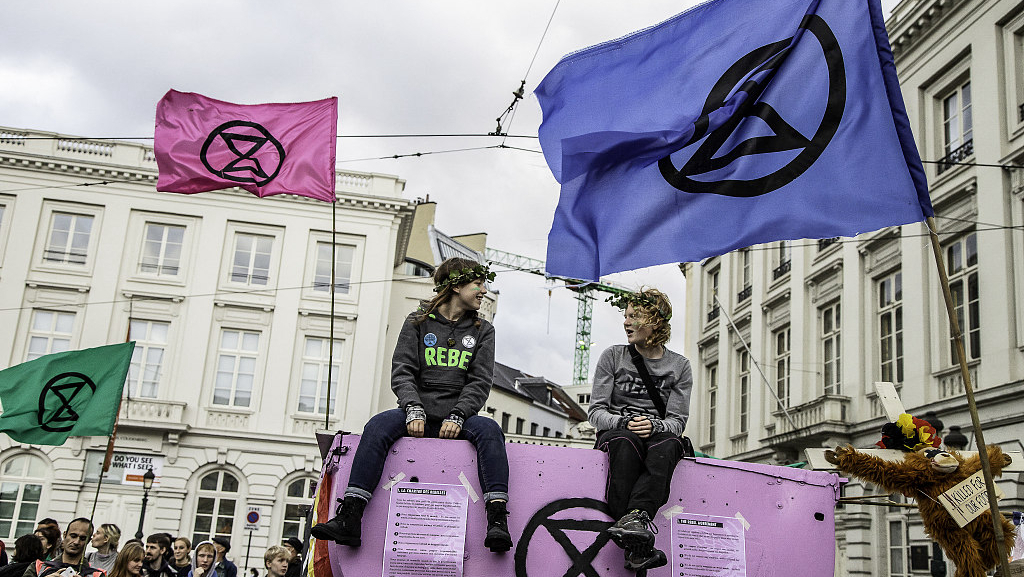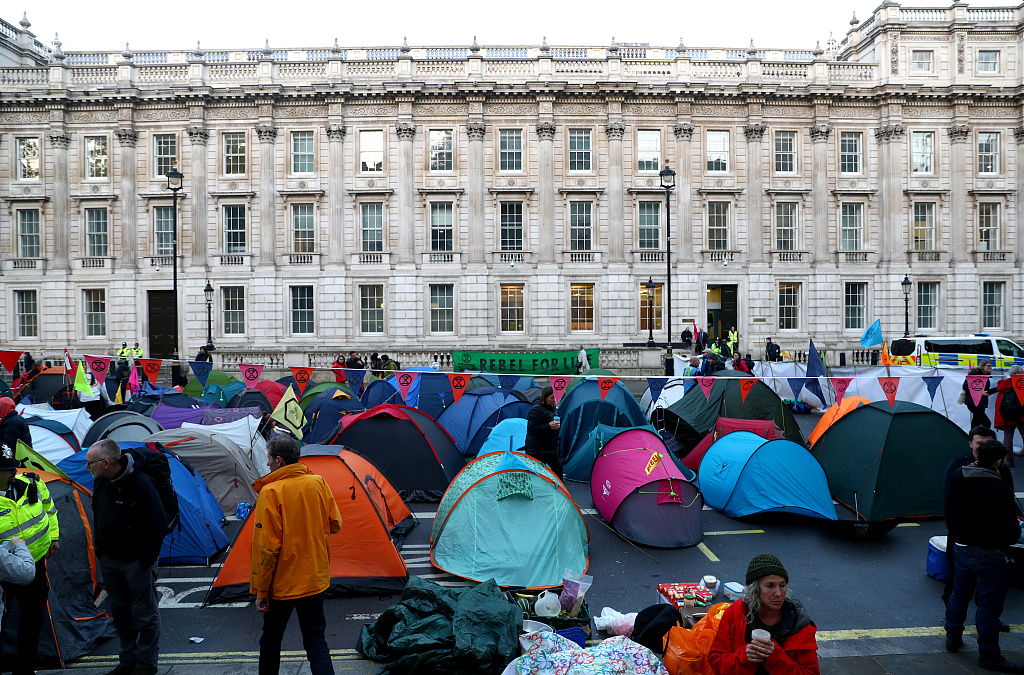
Activists from the climate change action group Extinction Rebellion gather during a protest at the Place Royale in Brussels, Belgium, Oct 12, 2019. /VCG Photo
Activists from the climate change action group Extinction Rebellion gather during a protest at the Place Royale in Brussels, Belgium, Oct 12, 2019. /VCG Photo
Editor's note: Freddie Reidy is a freelance writer based in London. He studied history and history of art at the University of Kent, Canterbury, specializing in Russian history and international politics. The article reflects the author's opinions and not necessarily the views of CGTN.
Bursting onto the scene in November 2018 with a campaign of bridge closures across London to highlight the current "climate catastrophe," Extinction Rebellion (XR) has become one of the preeminent environmental pressure groups in the United Kingdom. Their latest campaign across London though, is increasingly regarded as something of an "own goal," but why?
Environmental campaigning in the United Kingdom is not new. For centuries people have campaigned to "save" the environment and press for further legislation.
Such campaigns were a driving force during the 1960s and were a suitable accompanying cause to the wider themes of liberalization of the society, not just throwing off the shackles of Victorian convention but also pointing to the industrialization and exploitation of natural material and manpower that gave rise to it.
There is, therefore, an inextricable connection between the hippy movement of the 1960s and of ecological activism in the public consciousness. This link between the two has been a hard image to shake off, and in many respects, there hasn't been much of a desire to do so.
By extraction, there is also an assumption that business is the enemy of the environment. After all, is it not business that extracts fossil fuels, produces harmful chemicals and is responsible for much of the world's pollution?
This line which has been drawn has arguably suffocated the pace of change and reform that campaigners are so keen to see. By creating an "us and them" atmosphere, a groundswell of public sentiment has been harder to achieve.
The television presenter and ecologist David Attenborough has become something of a hero for the cause of environmentalists over the last few years with an ever-increasing circulation of his warnings utilized in social media campaigns. Last year, the 93-year-old even addressed the Glastonbury Music Festival.
Strangely, Extinction Rebellion seems to have missed why Attenborough has been so successful in highlighting environmental concerns. Attenborough, gentle, affable, appears reasonable and has fostered trust. He has brought the beauty of the natural world into people's homes but has also warned at how delicate the natural world is and what responsibility we have as humans to protect it. This approach is in stark contrast to the apocalyptic prophesizing of Extinction Rebellion.
London views itself as truly multicultural, vibrant and accepting — a city that has survived the Blitz in the Second World War, Irish Republican Army terrorism in the 70s and 80s and further terrorist attacks in the 21st century.
It is not a city, Brexit notwithstanding, given to perpetual mass protest. Extinction Rebellion's latest indiscriminate campaign of disruption has, therefore, not garnered great sympathy.

Extinction Rebellion protesters demonstrate at Whitehall, London, Britain, Oct 8, 2019. /VCG Photo
Extinction Rebellion protesters demonstrate at Whitehall, London, Britain, Oct 8, 2019. /VCG Photo
There is genuine support for the cause though. The UK has, over the years, seen an investment in renewable energy, an increase in the use of hybrid transport, as well as a surge in domestic and industrial recycling. There is also a political will to tackle the effects of climate change, including landmark legislation committing the UK to becoming carbon neutral by 2050, and yet there is still a desire to do more.
In a world increasingly driven by megaphone politics, the approach of Extinction Rebellion has certainly struck a flat note in some quarters. Extinction Rebellion's latest campaign has seen the targeting of the London underground system affecting thousands of commuters at some of London's busiest stations. The targeting of seemingly green methods has seriously undermined XR's credibility.
Extinction Rebellion, therefore, is failing to capitalize on the support among the general public to do more to reduce the UK's carbon footprint and to slow the effects of climate change.
Stunts such as those at Canning Town station in one of London's poorest boroughs will not foster support but erode sympathy for the group. Commuters should not be the targets of XR. That is a feeling evidently shared by those on the platform that morning when protesters were forcibly removed from the train by the commuters themselves.
There is also the question of authenticity undermining the group and leading to it being regarded as anarchistic rather than a force for good. Extinction Rebellion protesters have been photographed buying McDonald's in addition to a litany of other contradictory PR gaffes.
Last year, actress Emma Thompson was spotted returning to LA on a British Airways flight in first class having just railed against those polluting our planet at an XR event.
Appearing on a daytime show and confronted with these allegations, XR co-founder Skeena Rathor claimed that "it's not about my carbon footprint; it's not about an individual's carbon footprint." Thus, raising the question: why target individuals on public transport?
The wider issue with the group is that in Britain, people are generally making a concerted effort to reduce their carbon footprint and wish to do more. Extinction Rebellion isn't telling people what they can do. Their website proclaims "join the rebellion," but there is no information on what people can do beyond protesting and donating money.
The fact that the group sees itself as a "rebellion" instantly frames their cause as being against something, rather than for it. It is, by definition, divisive rather than inclusive.
Extinction Rebellion, therefore, has fallen into the same trap as their hippy forbears. The group has entrenched a division between the public and cause. To rehabilitate their reputation and achieve their objectives, Extinction Rebellion needs to embark on a positive campaign of "can do" that fosters the collective responsibility so needed to address the enormous challenge of climate change.
(If you want to contribute and have specific expertise, please contact us at opinions@cgtn.com.)